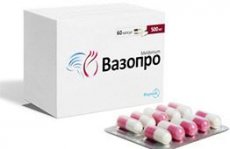Medical expert of the article
New publications
Preparations
Vasopro
Last reviewed: 03.07.2025

All iLive content is medically reviewed or fact checked to ensure as much factual accuracy as possible.
We have strict sourcing guidelines and only link to reputable media sites, academic research institutions and, whenever possible, medically peer reviewed studies. Note that the numbers in parentheses ([1], [2], etc.) are clickable links to these studies.
If you feel that any of our content is inaccurate, out-of-date, or otherwise questionable, please select it and press Ctrl + Enter.

Vasopro belongs to the pharmacotherapeutic group of cardiac drugs that stimulate contractions of the heart muscle. International nonproprietary name - Meldonium, synonyms - Metonate, Milcardil, Mildrazine, Vasonate, Midolat, Cardionate, Celebis, etc.
Indications Vasopro
The drug Vasopro is prescribed for such pathologies as:
- chronic heart failure;
- ischemic heart disease;
- angina pectoris;
- myocardial infarction, including acute;
- subcompensated and decompensated circulatory disorders;
- cerebrovascular insufficiency, including stroke;
- hemorrhages and thrombosis of the retinal vessels;
- decreased performance during physical overload.
Vasopro is also used in complex therapy of alcohol withdrawal.
Release form
Vasopro is available as an injection solution in 5 ml ampoules, as well as in the form of 250 and 500 mg capsules.
Pharmacodynamics
The cardiotonic effect of Vasopro is provided by the active substance meldonium (methonate or 3-2,2,2-trimethylhydrazinium propionate dihydrate), which suppresses the synthesis of the amino acid L-carnitine, which transfers activated fatty acids through the internal mitochondrial membranes. Thus, under conditions of hypoxia and ischemic stress, carnitine-dependent free-radical oxidation of lipids in myocardial cells and their breakdown into neurotoxic derivatives of acylcarnitine and acyl-coenzyme A are inhibited.
The vasodilatory effect of Vasopro is due to the fact that a decrease in the level of L-carnitine activates the synthesis of the physiologically active substance gamma-butyrobetaine. The drug stabilizes the balance of oxygen production and consumption by cells. In addition, the intensity of glucose breakdown associated with the formation of ATP increases, and thus the energy supply of cells is optimized. Due to this, the tone of the myocardium and its ability to contract significantly increase, and blood circulation in the ischemic focus, in the vessels of the brain and retina improves.
Pharmacokinetics
The bioavailability of Vasopro when taken orally is 78%, the maximum concentration in the blood plasma is reached on average after 2 hours. When the drug is administered parenterally, bioavailability is 100%, and the maximum concentration in the plasma is reached immediately after injection. The half-life ranges from 3 to 6 hours.
Metabolites formed during the transformation of the drug are eliminated by the kidneys - with urine. Their half-life is approximately 4.5 hours.
Dosing and administration
Vasopro in the form of an injection solution is administered intravenously: for cardiovascular pathologies - 5-10 ml per day; for cerebrovascular disorders - 5 ml once a day; for alcohol withdrawal syndrome - 0.5 ml twice a day (for at least 7 days). For retinal vascular pathology, the drug is administered by injection through the skin of the lower eyelid (parabulbar) - 0.5 ml per day, the course of treatment is 10 days.
In case of chronic heart failure and chronic circulatory disorders, Vasopro capsules are taken, the dose and duration of taking the drug are prescribed by the doctor.
 [ 2 ]
[ 2 ]
Use Vasopro during pregnancy
The use of Vasopro during pregnancy is also contraindicated, since clinical studies on the safety of this drug for the mother and fetus have not been conducted.
Contraindications
Vasopro is contraindicated for use in cases of increased intracranial pressure associated with impaired venous blood outflow or the presence of primary and secondary brain tumors, as well as in cases of organic lesions of the central nervous system caused by vascular pathologies of the brain, traumatic brain injury, exposure to toxic substances, etc.
This drug is not used to treat patients under 18 years of age. In chronic liver and kidney diseases, the drug should be used with caution.
Side effects Vasopro
The use of Vasopro may be accompanied by side effects in the form of headache, dizziness, cardiac arrhythmia, instability of blood pressure, dry mouth, nausea, diarrhea. In rare cases, general weakness, hyperemia and itching of the skin, urticaria, shortness of breath, dry cough, hyperhidrosis are possible.
 [ 1 ]
[ 1 ]
Overdose
There are no reports of overdose with Vasopro.
Interactions with other drugs
In the complex treatment of cardiovascular insufficiency and ischemic heart disease, Vasopro can be combined with drugs of other pharmacological groups: cardiac glycosides, antiarrhythmic, antihypoxic and antiplatelet agents, antianginal drugs for the relief of attacks of coronary insufficiency, as well as diuretic drugs.
Concomitant use of Vasopro may enhance the effects of nitroglycerin, calcium channel blockers (nifedipine), beta-blockers (metoprolol, bisoprolol, carvedilol), antihypertensive agents and drugs that relax the smooth muscles of peripheral blood vessels (vasodilators).
 [ 3 ]
[ 3 ]
Storage conditions
Storage conditions: at a temperature not exceeding +25°C, in a place protected from light.
Shelf life
Shelf life: 24 months.
Attention!
To simplify the perception of information, this instruction for use of the drug "Vasopro" translated and presented in a special form on the basis of the official instructions for medical use of the drug. Before use read the annotation that came directly to medicines.
Description provided for informational purposes and is not a guide to self-healing. The need for this drug, the purpose of the treatment regimen, methods and dose of the drug is determined solely by the attending physician. Self-medication is dangerous for your health.

